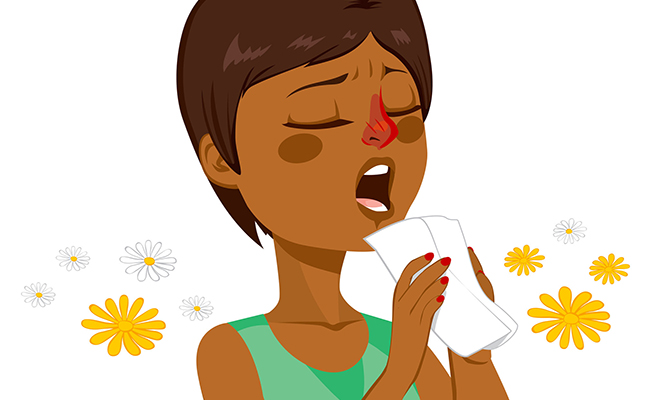These days, an increasing number of people are suffering from allergies. In fact, recent estimates suggest that one in three people in the west has, at one time or another, suffered an allergy of some sort. Pride shows you what you can do to protect yourself.
Britain has some of the highest rates in the world for asthma, eczema and hay fever, with the number of allergy cases rising at the rate of 5% a year. A recent study said that 39% of children and 30% of adults suffer from some form of allergy, including intolerance of some foods. Around 1,500 allergy patients die each year, mostly in asthma attacks, and more research is still needed to identify the root causes of allergies. A conservative estimate of the cost to the NHS is £1.07 billion a year.
Some allergies can be life-threatening, others just very uncomfortable. Whatever the symptoms, steps of prevention or cure have to be taken. Although conventional methods should not be overlooked, they often merely suppress symptoms rather than provide a cure. Here we take a look at safe, effective treatments to combat the underlying cause of three major allergies and intolerances.
ASTHMA
The underlying causes are uncertain, but it is known that asthma tends to run in families, particularly those prone to other allergic conditions. Children of low birth weight and those who are overexposed to allergens in their first year of life are most at risk, especially if their parents smoke. If you have a tendency to asthma, it can be set off by exposure to allergic and/or non-allergic triggers.
Allergic triggers include: Inhaled allergens, such as house-dust mites faeces, pollens and mould, spores and animal danders.
Home remedies:
Try the Buteyko method. Sit comfortably in an upright chair. Breathe in, then out and hold your nose. Pause for as long as you can. Try to practise four times a day and adopt a routine of four long pauses, followed by three minutes of shallow breathing and then two medium pauses. Breathe through your nose at all times, if possible, and avoid gulping air. Do not lie down, except to sleep, and, when sitting, try to remain upright.
Herbal remedies can also be beneficial for asthma sufferers, but steer clear of steam inhalations, as these can precipitate an attack.
Try the following:
• Roman camomile: Add 2–3 drops of the essential oil to a saucer of warm water and leave in your bedroom at night. (Avoid during pregnancy.)
• Eucalyptus: place a few drops of this essential oil on your pillow, or add 1ml to 25ml of carrier oil for a chest rub.
• Aloe Vera: In one study, a teaspoonful (5ml) of a 20 per cent solution taken orally twice a day over six months relieved asthma in people who did not require steroid medication.
• White horehound: Take as an infusion tincture or syrup.
• Eat magnesium-rich foods. Magnesium helps the muscles that line the airway to relax. Consider a low-salicylate diet – especially if aspirin makes your symptoms worse – and reduce your intake of food additives.
HAY FEVER
Up to 12 million people complain of suffering the reaction when the body treats a harmless substance, such as pollen, as an “invader”. Yet hay fever was virtually unknown until the 19th century and cases have doubled since 1965. The body releases histamine, which irritates the mucous membranes leading to sneezing fits, runny noses and itchy eyes.
If you know that pollens are the cause of your hay fever, smearing some petroleum jelly inside your nose can be effective. This is because pollen grains split and release their aggravating contents after landing on a watery surface, not a greasy one. Make sure you reapply the cream after blowing your nose.
If your symptoms are seasonal, find out which pollen are in your area at the time you have hay-fever problems.
In addition:
• Keep all windows shut, and use air filters in the home, work and in your car.
• When you go out, wear wrap-around sunglasses to protect your eyes. Avoid problem plants and, during the grass pollen season, take note of the pollen counts and forecasts provided by the media.
• After being out, rinse your hair (if possible), change your clothes and wash any furry pets that have been outside to eliminate pollen.
• Air the house every day, use extractor fans in kitchens and bathrooms, and cover pans that contain boiling water. Also use a dehumidifier if necessary.
• Dry your clothes out of doors. If you use a tumble dryer, vent it to the outside.
• Clean the seals around your fridge door regularly and throw out old food.
• Place a layer of sand on top of the soil of pot plants and water from the bottom.
• If you react to tree pollens, avoid hazelnuts, celery, carrots, swede, parsnips and potatoes.
• If you react to grass and cereal pollens, avoid milk and all milk products, including cheese and yogurt, and cereals like wheat, barley, rye, oats, corn and wild rice.
• Take antihistamines by mouth and steroid nasal sprays. These are both safe and usually effective when used every day, though it make take up to two weeks for symptoms to subside.
More information can be found in Overcoming Allergies by Dr Christina Scott-Moncrieff, Crysalis Books, £14.99

































































